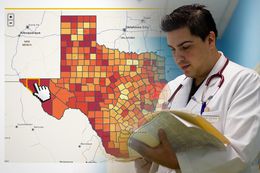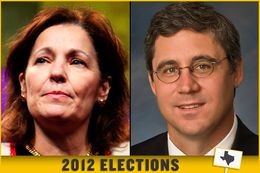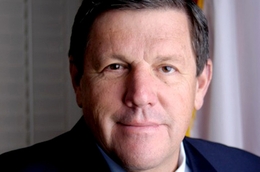
Texas, it’s official: We have the worst rate of health insurance coverage in the country. The U.S. Census Bureau released the 2011 Current Population Survey data on income, poverty and health insurance this week, finding that one in four Texans, more than 6 million people, had no health insurance in 2011.
That is a huge financial burden on the health care system in Texas that ultimately falls on Texas employers and the insured. The Texas Medical Association reports that in 2003 — when only 5.1 million Texans were uninsured, according to the CPS data — hospitals spent $208 million treating uninsured patients. “To cover these costs, hospitals charge insured patients higher prices, which in turn drives up insurance premiums,” according to the TMA's analysis.
Before delving into the political context and consequences of this issue, let’s take a closer look at the CPS data. (Keep in mind, it shows state and national trends over time and doesn’t provide many demographic details on poverty and health insurance coverage by state. More information on the demographics of poverty and health insurance coverage can be found in the American Community Survey data for 2011 that will be released by the U.S. Census Bureau next week. For 2010 information from the ACS on the demographics of the uninsured, check out this Texas Tribune interactive.)
The graph below shows a breakdown of Texas’ 2011 insurance market, according to the CPS data. Just over 50 percent of Texans had private employment-based health insurance coverage. The next largest group is Medicaid, followed by Medicare. Combined, government health insurance covered 7.1 million Texans while private health insurance covered 14.4 million.
Click on any of those bars to see the number of Texans in that insurance category over time. Looking at all of the annual trends, one thing is immediately obvious: While Medicaid and Medicare enrollment continues to grow, growth in private employment-provided insurance has plateaued. That isn't just a Texas trend, either. Nationally, the CPS data shows in 2011 there was no statistical change in the number of people with private insurance — the first time in 10 years that there wasn’t a decline — and enrollment in public insurance programs grew for the fifth consecutive year.
The growth in public insurance “can be driven by more kids. This could be driven by elderly. It could be driven by a bunch of other things,” said David Johnson, chief of the housing and household economy statistics division at the U.S. Census Bureau. “We don’t know what’s going to happen next year when states choose other things.”
We’ll get to that in a minute.
First, compare the number of uninsured in Texas (here's a county-by-county map of uninsured in the state) to the United States as a whole and to Massachusetts, the state with the lowest rate of people without health insurance. This graph shows the percent of the population that wasn’t covered by health insurance in 2001, in 2006 — the year former Massachusetts Gov. and current presidential contender Mitt Romney passed state health care reform — and 2011.
Texas has had a higher rate of uninsured than the national average for quite some time. And Massachusetts started with a much lower rate of uninsured than Texas. But five years after Romney’s health care reform took effect, the rate of uninsured is only 3.4 percent, which is 4.5 percent lower than that of Hawaii, the state with the second-lowest rate.
The Massachusetts health insurance reform law, like the federal Patient Protection and Affordable Care Act, requires everyone to purchase health insurance.
"We said, look, if people can afford to buy it, either buy the insurance or pay your own way. Don't be free riders and pass on the cost of your health care to everybody else," Romney said in 2008, the first time he ran for president, according to a CBS News report.
Romney wants to repeal the federal law, but if it remains in place, Texas has four more years to get its act together before the individual mandate that requires everyone to either purchase health insurance or pay a tax takes effect.
To get everyone insured, the federal legislation would expand the eligibility requirements of Medicaid in 2014, providing a large federal match for the first few years before shifting a greater portion of the financial burden to states, and set up a health insurance exchange to inform consumers — who will pay premiums on a sliding scale, depending on their income — of their health plan options.
But Texas Republicans have been highly opposed to the individual mandate and the state health insurance exchange that would go with it. Attorney General Greg Abbott fought the individual mandate all the way to the U.S. Supreme Court and lost. And Gov. Rick Perry has said Texas will not accept funds to expand Medicaid or set up the health insurance exchange, in which case the federal government will set up the program for Texas.
Perry’s still hasn’t specifically outlined the “health care solutions that are right for the people of Texas,” to which he continuously refers. Kaiser Health News has reported that Texas businesses — from insurance companies to private employers to hospitals — are putting pressure on the governor to expand Medicaid, because without that expansion, they’ll be forced to continue footing the bill for the uninsured.










